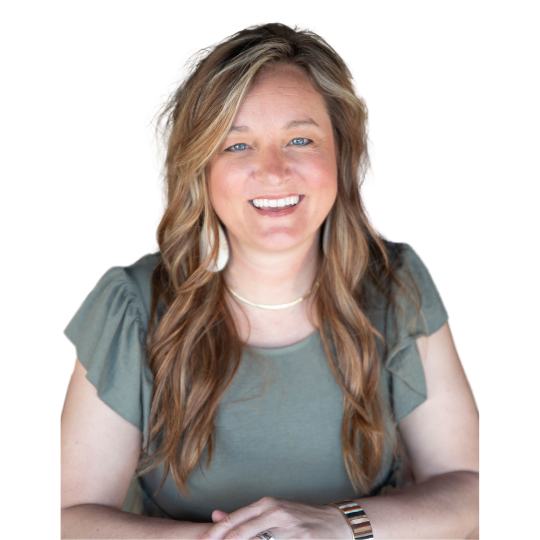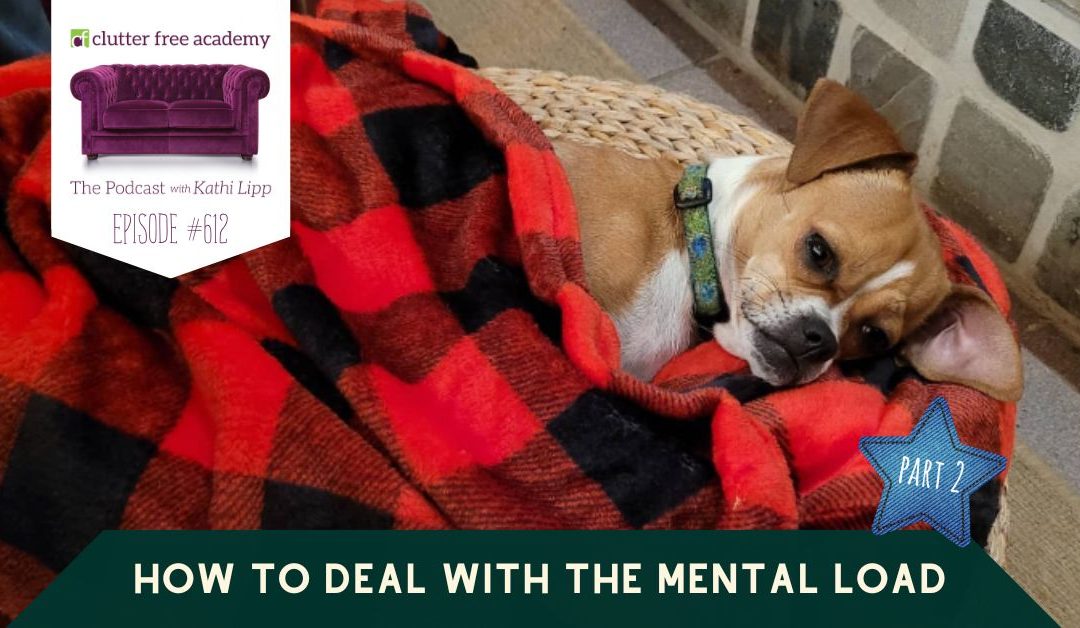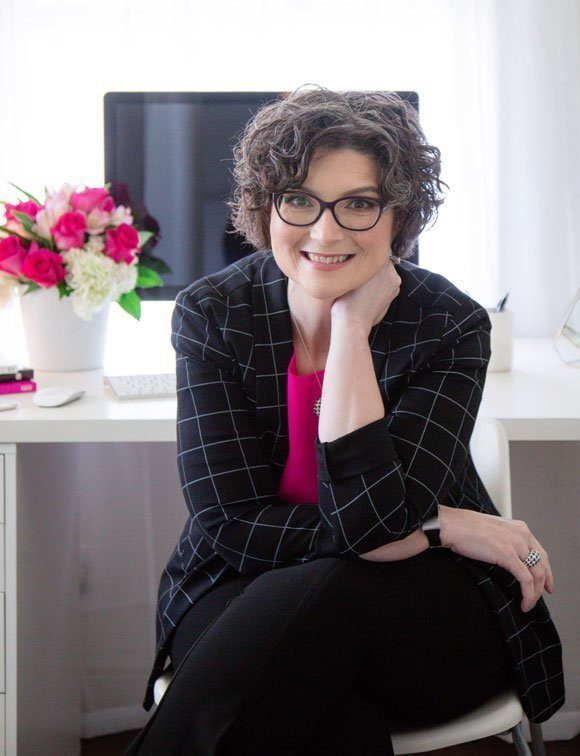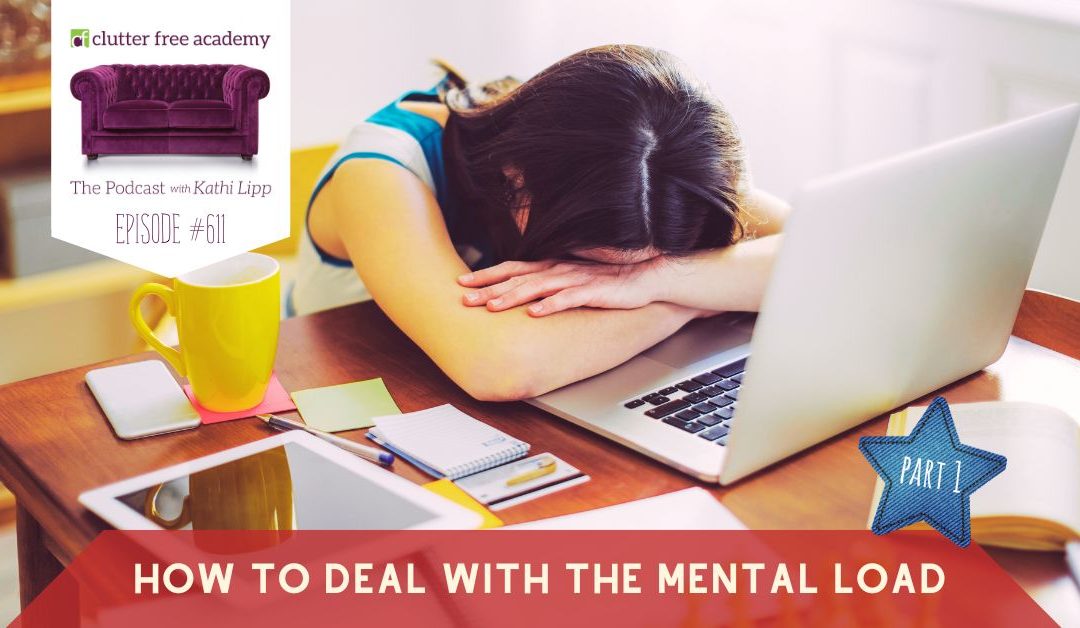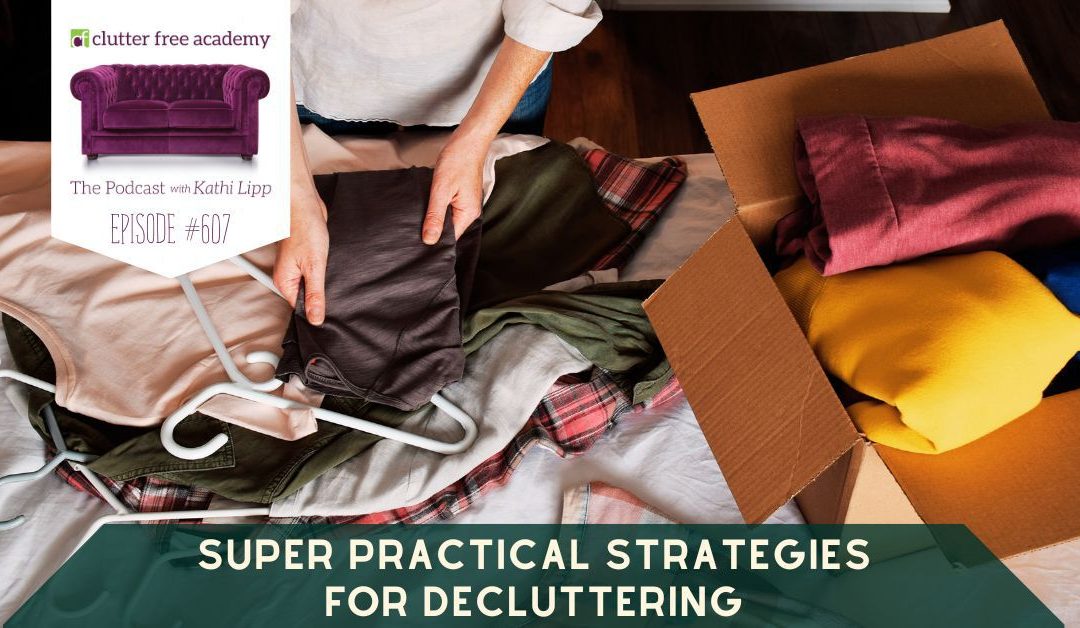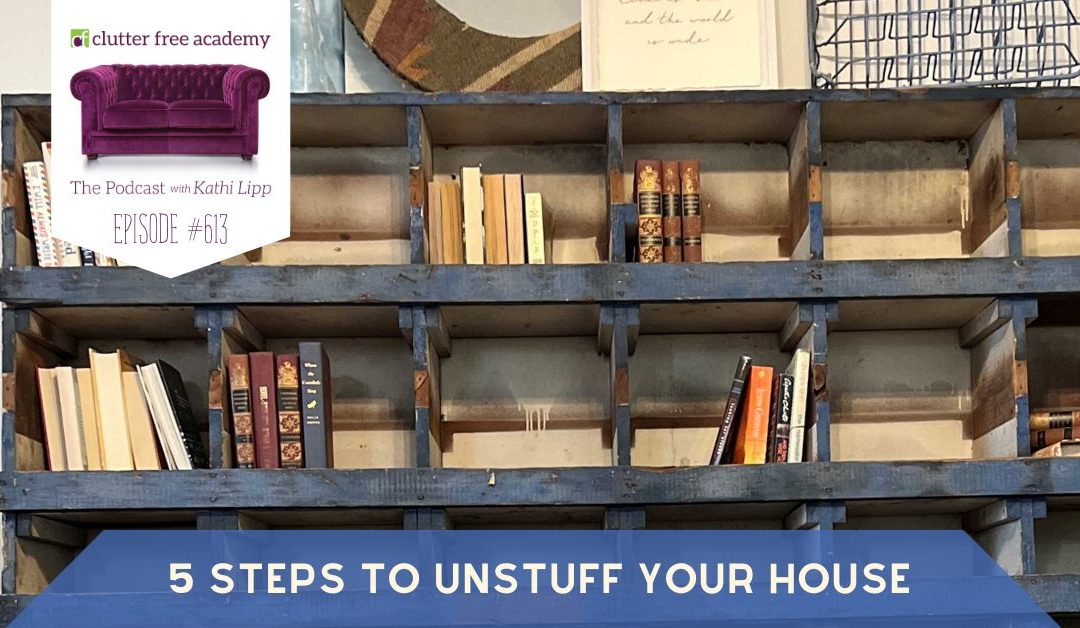
#613 5 Steps to Unstuff Your House
Are you feeling trapped in a home overstuffed with, well, STUFF? You’re not alone! In the latest episode of Clutter Free Academy, Kathi teams up with Tenneil Register, an incredible mom who mastered the art of living clutter free – even in the tight quarters of a fixer-upper with a blended family of seven! Tune in for their tips on:
- Making your house a home instead of a storage unit
- Using things you love as creative storage solutions
- Letting go of things that are no longer your vibe
In this episode, Tenneil mentions using repurposed items to decorate her space. Here are the promised photos!
And here’s Kathi’s favorite Suzani couch:
Sign up here to be notified when the next episode is released, or here to receive Kathi’s Clutter Free Kit!
The Accidental Homesteader: What I’ve Learned About Chickens, Compost, and Creating Home
Homesteading [hohm-sted-ing]
noun
1. an act or instance of establishing a homestead.
2. the act of loving where you live so much that you actively ignore the fact that your house is trying to kill you on a regular basis.
For Kathi Lipp and her husband, Roger, buying a house in one of the most remote parts of Northern California was never part of the plan; many of life’s biggest, most rewarding adventures rarely are.
Kathi shares the hard-won wisdom she’s gained on her homestead journey to help you accomplish more at home, gain fresh perspective, and give yourself grace in the process. Here’s a handful of the lessons Kathi shares:
- Prepare before the need arises
- Everything is always in process, including us
- Your best household solution is time and patience
- You don’t have to do everything the hard way
- Be open to new and better ways of doing things
- A lot of small changes make a huge difference.
Highly practical, humorous, and inspirational, The Accidental Homesteader will encourage you to live with more peace, joy, and contentment.
Order your copy of The Accidental Homesteader: What I’ve Learned About Chickens, Compost, and Creating Home here.
Clutter Free Resources:
Learn more about Clutter Free for Life
Join our Clutter Free Academy Facebook Group
Have you made creative storage solutions out of objects meant for something else, like Tenneil did? Share your answer in the comments.
Let’s stay connected
To share your thoughts:
- Leave a note in the comment section below.
- Leave an honest review on iTunes. Your ratings and reviews really help and I read each one.
Subscribe on iTunes or subscribe to our newsletter now.
Transcript
Kathi (00:01.463)
Well, hey friends, welcome to Clutter Free Academy where our goal is to help you take small doable steps to live every day with less clutter and more life. And guys, we love her. She may be newish to you, but she is going to become a regular over here at Clutter Free Academy. You guys.
It is my friend, Tenneil Register. Tenneil is a business owner. She has the cutest little store you’ve ever seen in your entire life. She runs an Airbnb. She’s had a blended family and is one of the coolest, most stylish people I know. Well, let me just call it, it’s country stylish, right? Okay, so welcome Tenneil. And when I say country stylish, I’m not saying, I’m not making that go down.
We were just talking about how Dollar General is, what’d you call it?
Tenneil (01:05.364)
is the rural girl’s Target
Kathi (01:07.455)
It’s so true, right? Like, you know you live out in the country when you’re like, oh, I could use that as decor. Like, it’s a different thing, right? And I mean, I just love it. And you have such an eye for that kind of stuff, which I do not. And so I love to see you decorating and stuff, but you had to get your house decluttered before you could make it all your own, didn’t you?
Tenneil (01:37.394)
I absolutely had a challenge of a lifetime when we bought our house after blending our family.
Kathi (01:43.851)
Okay, so I want to know the stats, like how many people, how many square feet, like how many his, how many yours, how many ours, you know, all that kind of stuff.
Tenneil (01:54.222)
Okay, so stats is five acres, 1800 square feet on an upper level. Yes, and then we have a basement, but it was unfinished.
Kathi (02:01.847)
I didn’t know it was that small
Kathi (02:07.64)
Oh my goodness. 18. Okay. Uh, how many people did you have?
Tenneil (02:12.13)
So I brought one to the table, he brought four. So there was five kids plus the two of us. So that made what we call our seven.
Kathi (02:14.359)
Right. Okay, oh.
Tenneil (02:23.28)
and
Kathi (02:23.351)
Okay, yeah, by the way, okay, so Roger and I did 1400 square feet, four kids, but one of them’s like, I’m out of here. Cause she was 18 and she didn’t wanna share a room with a 13 year old, which we totally got. But it was the hardest thing I’ve ever done when it comes to house and clutter and all the things.
Tenneil (02:45.802)
Yes, and we didn’t have all of them living with us full time, but there were times they were all here and we wanted everybody to have their own space. So in the house that we bought, it was a fixer upper, like there were no floors, just sub floors, and it had five bedrooms on that 1800 square feet. So you can imagine how small the kitchen-living room combo were to have five bedrooms in that 1800 square feet.
Kathi (02:49.956)
Mm-hmm.
Kathi (02:54.917)
Right.
Kathi (03:01.384)
Oh no. Oh no!
Kathi (03:09.079)
Yeah, right.
Holy cow, that is a ton. I mean, that is just a ton of people in such a small space.
Tenneil (03:15.09)
So.
Tenneil (03:20.658)
and all of those people come with stuff. And when you’re new to a blended family, your own stuff is really important. I can remember such long arguments over what to pack in a suitcase so it wouldn’t be over the weight limit and so that I wouldn’t be overwhelmed with the amount of laundry and things to keep track of. When Jesse and I got married, I had one three-year-old kid that I was pretty OCD with.
Kathi (03:28.135)
It really is. It really is.
Kathi (03:48.545)
Yeah.
Tenneil (03:49.187)
So transferring this to a large group of people, whoa.
Kathi (03:52.567)
Yeah, yeah, it’s a lot. And for all of you out there listening, we all have that one seemingly insurmountable clutter challenge. Maybe a parent has passed away and you’re bringing all their stuff to your house, or you’re blending a family, or you have to downsize quickly because of a financial situation or a health situation, or…
you are taking, you know, several of my friends who are Gen X or in the boomer generation, their kids are coming home with, you know, their spouses and their kids. And so these are all huge, huge situations. So when your house gets stuffed like that, like it’s almost like yesterday, okay, Tenneil this is a terrible illustration, but I have to share it now.
We went to a place called, I think it’s called Bad Donuts. I can’t remember what it’s called. It’s something like that. And what they do is they give you a donut. Roger and I have been wanting to try it. Oh, it’s called Bad Bakers, that’s right. And we’ve been wanting to try it. So we got this donut and they give you, I’m not joking, a medical syringe filled with cream that you stuff into this donut and this donut like puffs up. So by the way, it’s one of the best donuts I’ve ever had in my life.
But that’s how your house can feel like during these circumstances, right? It’s a weird one, but yeah. Yes.
Tenneil (05:19.254)
that’s an excellent illustration because you love your donut and you love your home and then when you fill it with something it kind of feels overstuffed.
Kathi (05:29.767)
Yes, and that’s exactly what was happening yesterday. I love that. I didn’t even pull that out. But yes, I love the donut I love this cream filling. It was a chocolate cream filling. Oh my goodness. It was amazing But yes, it felt like too much. It was getting everywhere Like i’m not even joking. I took Moose in for her doctor’s appointment I get back in the car and i’ve got this streak of chocolate on my face. I was so embarrassed, but you know what? If I have to be embarrassed, let me be embarrassed by chocolate. So
I, we’ve come up with five steps to unstuff your house. So I want to go through this with you and let’s figure out how we can help people who are in these circumstances, um, get through it. So the first step that you and I talked about is acknowledge and accept. So tell me what that looked like for you when you and Jesse got married and your house felt out of control.
Tenneil (06:22.422)
Yeah, so I think one thing is acknowledging the clutter issue. It’s not a people issue. It’s not a family issue. It’s an issue with stuff that needs to be changed and can be changed. So this isn’t about changing like our relationship with people. This is about changing our relationship with stuff so we can improve our relationships with people.
Kathi (06:26.691)
Mm-hmm. Mm.
Right.
Kathi (06:35.062)
Right.
Kathi (06:41.731)
Oh, it’s so true. And I think you have to give people a vision for it. Like, we know that this stuff is causing anxiety in our house. And we want to change that for everybody. Because it feels like it’s the people who are it’s such a good point Tenneil it feels like it’s the people who are giving you anxiety when a lot of it could just be the abundance of stuff, because that really can raise anxiety.
Tenneil (07:10.09)
Yes. And what am I holding on to? Like, why is that stuff bothering me? So for example, shoes by the front door, right? Am I really upset that the people are here and they took their shoes off? No, that’s what I want them to do. I want them to come here and I want them to take their shoes off. What the real frustration was no place for the number of shoes because we had so little floor space we couldn’t afford to give any up.
Kathi (07:13.415)
Hmm. Yes. Yeah.
Kathi (07:20.398)
Mm-hmm.
Kathi (07:25.952)
Right.
Kathi (07:35.979)
Yeah, you know, I don’t know if you know this story, but when Roger and I first got married, we had the shoes at the front door situation as well. And so I bought a bookshelf for people to put their shoes on. And I asked Roger to build it, and I asked him to put it behind the couch so that nobody would see it. And there was only one person in our house who ever used it. It was Roger. It wasn’t even me. It’s like, I’m not gonna go.
Tenneil (07:59.946)
Roger. I knew it.
Kathi (08:05.359)
So yes, to be able to say, and I think it’s important for us to say, this is temporary. Like we’re not gonna have teenagers forever. We’re not gonna have little kids forever. But right now we want them to take their shoes off because yeah, subfloors and things like that. I think that’s really important. So how did you set achievable goals in the whole idea of decluttering?
Tenneil (08:31.798)
Yeah, so I think with the achievable goals, we had to look and say, okay, what is it about this space and what can we do about it on no budget and without like really changing people’s behavior, right? And so on the shoe thing, right? It was deciding which of these things are the real problem. You know, is it the number of shoes? Is it where we’re keeping the shoes? So our first step was to…
Kathi (08:39.584)
Bre- Yes.
Kathi (08:44.517)
Yes.
Mm-hmm.
Kathi (08:52.892)
Mm-hmm.
Kathi (08:57.132)
Yeah.
Tenneil (09:00.534)
to recognize what we needed to get rid of. So I had always prided myself in having an entryway that was pretty. That when you walk in, people go, wow, okay, that needed to go, that was not a priority in that season of life.
Kathi (09:13.535)
Yeah, okay.
Kathi (09:18.975)
Right, you’re in survival mode at this point. Yeah.
Tenneil (09:22.526)
Yeah, and so, okay, how can we make this space work? So, all that decorative stuff was put out of the way and I chose pieces that were decorative that would do the job. So I found my favorite coat hanger. We actually made it from old architectural salvage trim and put big hooks on it, right? And this set limits, cause there’s seven hooks, seven people. You get one hook.
Kathi (09:26.631)
Mm-hmm. So what’d you do?
Kathi (09:33.243)
Yeah.
Kathi (09:44.919)
Oh my goodness. Uh-huh.
Kathi (09:51.532)
Ah, you get one hook, baby.
Tenneil (09:54.338)
I’m not going to complain how over-stepped your hook is, even though I would like to, but you just get your one hook. And then I found this old hardware bolt bin. So this thing is like probably seven feet tall. It’s as tall as our ceiling. And it’s like, I don’t know, I think it’s five or six rows wide. I think Jesse and I shared a row for a while and full of cubby holes.
Kathi (10:00.074)
Yeah.
Kathi (10:04.237)
Okay.
Kathi (10:08.34)
Oh my goodness.
Kathi (10:14.311)
Mm-hmm. Okay.
Mmm.
Tenneil (10:19.582)
And in those cubby holes, you can put your shoes, you can put your glove, you can put your baseball. I’m not gonna fight about what’s in the cubby hole as long as it’s not on the floor.
Kathi (10:27.243)
Right? Yes. It’s so true. It’s about agreeing on space, not arguing about stuff. And so this is your space. You can’t keep 10 pairs of shoes in there. It won’t fit. So you have to figure out, if you wear the same shoes every day, you’re golden, baby. But if you wanna change them out, you’re gonna have to put some things in your room, that kind of thing. Yeah, I love that.
Tenneil (10:43.351)
Right?
Tenneil (10:52.714)
Yeah, so we acknowledged what needed to happen. We sorted out what the space needed to be used for and came up with a function and a purpose for that, which led to good storage.
Kathi (10:56.443)
Mm-hmm.
Kathi (11:07.019)
Yes, and I love that you know sometimes you have to do temporary things until you find what you love but You you found some things you love are those things still hanging in your house? Okay, i’m gonna need a picture of those because I want to see what we’re talking about here is that okay? Okay
Tenneil (11:18.102)
They are.
Tenneil (11:24.554)
Yeah, absolutely. And I will send you the picture that includes the shoes laying on the floor in front of the rack where they go, because we are still human, but it is so much easier to bend over and put them up in the shelf or to say something like, hey, you have till 5pm to get those up in the shelf. Now, I’ll tell you, I don’t know where this fits into our five steps. However, the key to implementing like this category and storage for the people when they were young.
Kathi (11:30.086)
Hehe
Kathi (11:33.879)
Of course.
Uh, I love it.
Right.
Kathi (11:52.631)
Yeah.
Tenneil (11:55.382)
was that I would say, okay, you have till the end of the day to use the systems we have in place. And then anybody who didn’t, I didn’t complain, I didn’t nag, I didn’t yell. I simply picked up all of the things and they went in a tub. And to get your things out of the tub, you would have to do a chore.
Kathi (12:00.27)
Right?
Kathi (12:14.303)
Nice I love that you had to ransomware it was ransomware it was an I Love it, okay guys. We’re gonna take a quick break. This is only step one of five So we’re gonna blast through those last five But we want to help you unstuff your house, and we’re gonna continue to do that when we come back
Tenneil (12:19.502)
Absolutely, it was highly effective for us.
Kathi (12:36.583)
Friends, we are here with Tenneil Register, who, she’s got the style, guys, she’s got the style. And we’ve already talked about our first step to unstuffing your house is to acknowledge and accept what the situation is. And I love what you said. It’s not that you want the people out of here for most of us. Okay, some people, at one point we did have to have a Come to Jesus meeting and say, you have to move out. You don’t live here anymore. But, but.
Tenneil (13:01.924)
Hahaha!
Kathi (13:05.431)
It’s the stuff and we need to figure that out as well. Okay, so let’s go to step number two, sort and categorize. So as you’re decluttering, we have our three bag, well, it’s really a five bag system. So put away, give away and put back. So put back is in the room that you’re already in, put away is, it’s other rooms, sorry, other rooms and then give away.
is what are you gonna donate? And then we have garbage and recycling. So is that what you did? Or how did you keep up on decluttering, especially during like a remodel and stuff? How did you do that?
Tenneil (13:51.726)
So definitely our categories were similar. Whenever we approached a space, I took the idea, what are we gonna keep? Because kids or all of us as humans, we have a hard time deciding what to get rid of. So we went into the space assuming we’re gonna get rid of everything other than what we’re gonna keep. Then once we had our keepers, we sorted out, okay, would you feel better about donating this, selling this or pitching it? And so that was really important.
Kathi (13:55.611)
Mm-hmm.
Kathi (14:00.632)
Yeah.
Kathi (14:06.648)
right.
Kathi (14:11.216)
Mm-hmm. Yeah, so smart.
Kathi (14:18.124)
Mm-hmm. Right.
Tenneil (14:21.994)
Because we live in the Midwest and we experience all four seasons in such a significant way, seasonal sorts were critical. Because we literally change out all of our clothes, all of our gear for leaving the house, the sports equipment, like everything changes by the season.
Kathi (14:25.52)
Mm-hmm. Right.
Yes.
Kathi (14:33.227)
Right?
Kathi (14:38.875)
Tenneil I had no idea. I lived in the Bay Area, which is the most moderate temperatures, probably in the United States. Like rain was such a big deal, we didn’t know what to do with ourselves. And then I moved to the mountain where, today, on this day of our Lord, we are bringing down our summer winter stuff.
because and it’s like it’s a huge deal. It’s a huge deal. And today is the day we’re putting away the snowshoes. And I mean, it is such a huge deal. So if you live in these other places, it really, you’re not just turning over your house, you’re turning over your wardrobe, your equipment, all of that stuff, right?
Tenneil (15:28.054)
Yes, and so each time you do that, it’s important to purge, purge, purge.
Kathi (15:32.599)
Yes, yes, yes. And I love, you know, we’re doing this right now. And when we come, I’m purging two different categories. I’m saying, okay, what have I not worn all winter? And then as I pull down my spring and my summer, just really recognizing in myself, do I still love this thing? And it’s okay to say no.
It’s okay to say, you know what, I bought that last year at Costco because I thought it was cute, but it’s not my vibe. And I would rather it go to somebody who will love it and use it instead of keeping it and just punishing myself every time I open up the closet. We’ve had to do that with equipment that, you know, we bought what we thought was the right thing, turns out it wasn’t. And let’s get into the hands of somebody who’s it is the right thing.
How does that work out for you?
Tenneil (16:30.902)
Yes, I love that we’re only keeping what we love, what we use. And for me, at the beginning of the podcast, we talked stats. Stats were super important in helping us manage stuff for so many people in one household. So for example, I learned it at first when we were packing for trips, that I would have to be very specific. I want you to pack three pairs of shorts, three pairs of shirts, two swimsuits, right? I would give them the numbers.
Kathi (16:37.295)
Yes.
Kathi (16:40.759)
Yes.
Kathi (16:45.878)
Right.
Kathi (16:49.919)
mm-hmm yes
Tenneil (16:58.998)
The same helped when we would purge. I want you to pick your five favorite dresses. I want you to pick, you know, your two best snow boots. And then helping them find a meaningful place to pass it on was the best part of helping them let it go. So whether that was like a younger niece or nephew who would be thrilled to have their Nike tennis shoes or whatever. And then also like we used our local…
Kathi (16:59.343)
Mm-hmm.
Kathi (17:04.623)
Hmm, yeah.
Kathi (17:11.409)
Mm.
Kathi (17:20.876)
Yes.
Tenneil (17:28.554)
like food pantries also give out clothing closets. And my kids really had a deep understanding that somebody else would really love to get their nice things. And that helped as well.
Kathi (17:32.24)
Yes.
Kathi (17:39.935)
Mm-hmm, right. Oh, I love it. Okay, step number three. Instead of discussing this, because what I wanna talk about, what step number three is implementing storage solutions. Here’s what I would love to, Neal. We’re gonna get the pictures of your bolt bucket and your clothes hanger. And if you have a couple other pictures of storage solutions that you’ve used, because we could talk about it all day, but…
Literally, a picture is worth a thousand words here. Would you be willing to do that for us?
Tenneil (18:15.658)
I would love to share pictures of how I used decorative pieces that have rural vibes because that’s who I am to organize the things. And that made it fun for me too because I got to pick something creative to manage all the stuff. So I’d love to share photos of how we managed all the things over the years.
Kathi (18:20.695)
Yeah.
Kathi (18:31.648)
Yes.
Kathi (18:36.567)
I can’t wait and then we’ll have to come back on another podcast and discuss how you How you use those because I think that’s gonna be really interesting to people and how you came up with it. Okay step number four and For me, this is I had to admit That I am not a minimalist
I’m not a minimalist. I like stuff. I like things that suggest who I am. And I’m wondering, where do you put yourself in that category?
Tenneil (19:18.286)
Hmm. I would also say I’m not a minimalist. I like to change out my decor seasonally. I like to use decorative pieces to store things that are typically from like a family travel. So like I love to like antique and thrift. So if I find a box that I love that has the name of a place that we are traveling.
Kathi (19:26.139)
Hmm.
Kathi (19:38.158)
Okay.
Kathi (19:47.891)
oooo
Tenneil (19:48.902)
I want to bring that home and I want to use it. So the key for me is to find like a purposeful way to use it.
Kathi (19:51.595)
Mm-hmm.
Kathi (19:56.191)
Oh, I love that so much. Yeah, and I think it’s okay to say we’re not minimalist. That’s not our aesthetic, but we don’t wanna be stuffed either. We wanna find that happy meeting of having, I love things that have a story, just like you. Sitting on my bed is a teddy bear. This is a teddy bear that my son got 35 years ago, but it still makes me smile every time I see it.
Tenneil (20:14.271)
Yes.
Kathi (20:26.239)
Uh, you know, I’ve got, I’ve got a couch that I remember like, you know, I, I love it because it’s beautiful, but also the memory of finding it and calling Roger and taking pictures and saying, you know, I never called him and I’m saying, by the way, I’m buying this, but that’s what I did. By the way, I’m buying this because this is my, you know, how people have their heart animal, like this is my ride or die. That was this couch.
And so I’ll make sure I take a picture of that couch so you guys can see that. I’ve shared it here before, but it’s called a Suzani print, which is a Middle Eastern print that I adore it. And it’s just who I am. So I love that you collect things that are from travels and things that are important to you and your history. I think that that’s amazing. I think about like the gift that was most meaningful to my mom.
Tenneil (20:55.231)
Mmm.
Kathi (21:25.179)
from my daughter was a Kansas City pillow. You know, it just had all these things from Kansas City on it and my mom loves it. I mean, she loves where she was born so much. Her cat’s name is Casey. So, you know, we love that. Okay, and then step, oh, go ahead, yeah, please.
Tenneil (21:41.282)
So I was thinking as you were talking, Kathi what if we could answer two questions? Why do I love this? How or where will I use it? And then it’s a keeper.
Kathi (21:48.691)
Okay.
Kathi (21:54.047)
Ooh, those are such good ques- yeah, that is such a good question. And before you bring it home to be able to answer those two questions, I think is a real, and you know, if you absolutely love it and you haven’t figured it out yet, okay, if you just know, like this Suzani couch, I did not know where I was going to put it, but like, oh, we’re making a space for that. Um, which is pretty funny to do with a whole couch, but it’s some place I love.
Tenneil (22:02.603)
Yes.
Tenneil (22:19.702)
Ha!
Kathi (22:21.115)
But yes, I think that that’s so important. And I think it’s really important to not bring things home to fill a space because it’s very easy to be like, oh, you know, I could really use X, Y. And I’ll admit, I have a couple of pieces of furniture that were fill a space furniture. And one of them I’m giving away this week. It’s an extra wide chair.
that I just I needed to fill a space downstairs and now I should have waited for something I love the good news is I have a friend where this is the perfect chair for her and what she needs so I love that but okay number five um I think in unstuffing your house there there’s a time element which is to set time aside
but also to not rush the process, especially when other humans and emotions are involved. And it sounds like that’s what you did, that you started the process, but you were not telling people, okay, you have to be able to fit everything into a suitcase and otherwise you can’t have it in the house. You were making space for the people.
Tenneil (23:42.006)
And you have to be willing for error to occur. The bolt then that worked for our shoes was not my first attempt at where to put our shoes. You know, like tried putting them in the closet, you know, tried putting them under a bench, tried saying you can, I did try to say, you can only have one pair of shoes out here by the door, the rest go to your room. That was fighting behaviors in humans that I was going to lose.
Kathi (23:46.215)
Mm-hmm. Okay.
Kathi (23:52.539)
Oh, really? Okay.
Yeah.
Kathi (24:02.149)
No.
Kathi (24:06.105)
Yeah.
Tenneil (24:09.11)
So you have to be willing to kind of make mistakes and learn from the process while you figure out which category of stuff should go here and what storage unit should we use to hold that stuff.
Kathi (24:17.732)
Yeah.
Kathi (24:23.871)
Yeah. So really what you were doing and I, it’s my favorite word in the world. You were curating. You really were taking your time. Curation does not happen in a day. It happens over a lifetime. And you were curating the space for your family.
Tenneil (24:42.778)
You know when we go into a space what makes us most comfortable whether it’s someone’s home, a hotel, an Airbnb, a restaurant is when we are guided through the process so simply that we never find ourselves asking where should I put this? What should I do next? And so how important that in your own home everyone who lives there feels comfortable knowing where should I put this and what should I do next?
Kathi (25:00.123)
Hmm, yeah.
Tenneil (25:11.138)
that that’s not disruptive to their feelings of home, especially in a blended family situation.
Kathi (25:11.384)
Yeah.
Kathi (25:19.332)
Mm, ah. Tenneil, I have loved this conversation. This has been amazing. And I’m gonna make sure that we have all of your socials on here. So if people wanna follow, because I just think your life, especially on Instagram, is so inspirational with what you’re doing and how you’re creating and curating things. I think people would love to follow you. Tenneil, thanks so much for being on Clutter Free Academy.
Tenneil (25:46.795)
Thanks for having me. I’ve enjoyed the conversation so much and I look forward to talking more
Kathi (25:49.183)
Yeah, it’s so fun and deep at the same time. And friends, thank you for listening to Clutter Free Academy, I’m Kathi Lipp. Now, go create the clutter free life you were always designed to live.









